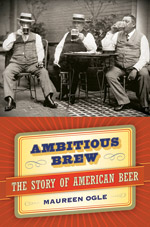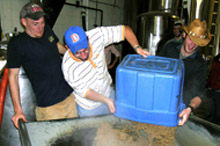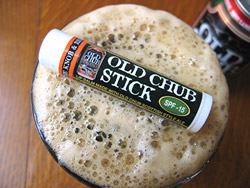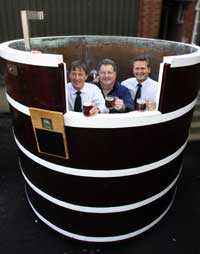Here is the final installment of your conversation with Maureen Ogle, author of the Ambitious Brew. The first two: Part one ~ Part two
7. How did beer change for you in the course of researching and writing the book?
 The short answer is that when I started the book, my only experience with beer was back in college (dime-beer hour at the Vine in Iowa City). And for most of the book, beer remained an abstraction, just something that had earned a fortune for all those dead people I was writing about.
The short answer is that when I started the book, my only experience with beer was back in college (dime-beer hour at the Vine in Iowa City). And for most of the book, beer remained an abstraction, just something that had earned a fortune for all those dead people I was writing about.
But then I began interviewing the living, and everything changed. The men and women I talked to – Jim Koch, Byron Burch, Nancy Vineyard, Dick Yuengling, and others – were lively, intelligent, fully engaged with the world around them – and utterly passionate about beer.
That got my attention. What was it about beer, I wondered, that inspired someone like Fritz Maytag, for example, who had the brains and ambition to do anything, to fashion a career out of beer? So one day I went to the store and bought some beer (trying to find ones brewed by people I had interviewed) and began tasting. And thinking about what I was tasting, and marveling at the color of these beers (there are few things more beautiful than a fine beer!) I was hooked. Beer, I discovered, was every bit as complex and interesting as wine, perhaps more so. And it tasted as good, if not better, with food.
Do I qualify now as a beer connoisseur? No. No one’s ever gonna ask me to supervise a beer tasting or ask me to judge a competition. But I admire fine beer and I’ve learned enough about beer to know what I like and don’t like. And perhaps most important, I know enough to respect the skill and art required to fashion a fine beer.
Because of the way our “printing press” works we can also include the longer answer:
Brewing is one of the most heavily regulated (and taxed) industries in the United States: federal, state, and local laws determine when and where beer can be sold, who can buy it, and even the wording and content of labels.
That’s not always been the case. The late nineteenth century may not have been the golden age of the beer itself (today we enjoy more variety and the quality of contemporary beers typically surpasses that of ones made a century ago), but it was a halcyon age of few regulations and low taxes.
Congress only levied a tax on beer in 1862 in order to generate revenue to fight the war against the Confederacy. After that taxes drifted upward slowly and fitfully: brewers were well-organized and had plenty of friends in high places. Moreover, selling beer was easier than at any other time in American history. Back in the near-utopian nineteenth century, brewers were allowed to own saloons. Most owned dozens if not hundreds, funneling their lagers directly from brewery to their “tied†taverns.
But then came prohibition, the short-lived experiment in sobriety that fundamentally altered the way brewers operate.
Prohibition was the brainchild of the Anti-Saloon League, a group of social activists who believed alcohol was impeding national progress. Their original goal was simple and logical: shut down the saloons. Close the saloons and brewers would have no place to sell their wares, and they’d be forced to close their own doors.
Between 1895 and the onset of World War I, that plan worked, as one precinct and town, one county and one state after another voted itself “dry.†Even places that remained “wet†imposed new barriers to the brewers’ way of life, levying enormous license fees on saloonkeepers and new taxes on brewers, and ordering saloons shut on Sunday,
Beer came back in 1933, but the good old days did not. The laws that legalized beer also surrounded brewing with a jungle of regulations and restrictions: No more “tied†houses. Every word of every beer label had to be approved, and at multiple levels: what a state regulator might allow on a label, a city licensing board might deny. Taxes soared, crippling marginal beermakers and driving them out of business.
And so it continues today: brewing is a fiercely competitive business, but behind the headlines of Anheuser-Busch duking it out with Miller lies another tale, as brewers struggle to comply with federal laws; with fifty sets of licensing and sales laws in the fifty states; and thousands of other regulations imposed by counties and municipalities. And the taxes go up and up and up ….
Making beer? It’s never been harder than it is today. All the more reason to admire and appreciate those brave souls who enter the business every day, men and women whose passion for fine beer outweighs the burden of regulations that will shape their working lives.

 Colorado State University students got their hands pleasantly dirty when their Brewing Science and Technology class visited
Colorado State University students got their hands pleasantly dirty when their Brewing Science and Technology class visited  Based on research Oskar Blues Brewery in Colorado conducted nobody has ever made lip balm with beer and beer ingredients.
Based on research Oskar Blues Brewery in Colorado conducted nobody has ever made lip balm with beer and beer ingredients.  With production ending at George Gale and Company in Horndean, Bob Marvin (he’s the one in the middle) realized that a bit of brewing history could be lost.
With production ending at George Gale and Company in Horndean, Bob Marvin (he’s the one in the middle) realized that a bit of brewing history could be lost.